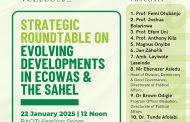In Nigeria, the Great Debate About Whether Democracy Comes Before Development or Vice-versa Has Not Even Started, Not Even Under Buhari – Yakubu Aliyu
By Adagbo ONOJA
THIS INTERVIEW IS BEING REPUBLISHED BECAUSE OF THE VOLUME OF COMPLAINTS REGARDING THE MIX UP IN THE FIRST AND SECOND PARAGRAPHS OF THE INTRODUCTION. IT WAS CAUSED BY EDITING ON THE DASHBOARD AND FAILING TO DROP THE CORRECTIONS, MAKING THE AFFECTED SECTIONS MEANINGLESS. OUR APOLOGIES AND GRATITUDE TO ALL THE CALLERS AND E-MAILERS – EDITOR

Yakubu Aliyu, Nigerian Development expert
There is a democracy – development conundrum for all countries which have not achieved industrial civilisation yet. The conundrum is which one comes first? Is it democracy first and then development later or the other way round? It is an important question because the two do not seem to go together. The Asian Tigers achieved industrial transformation without democracy. During their time, the classic statement on the problem is still the 1991 intervention by Lee Kuan Yew in a short interview with The Economist where the late Singaporean leader argued that democracy is not conducive to rapid growth for an agricultural society because such society has to create agricultural surplus to kick start their industrial sector.
In his analysis a, dictatorship or authoritarian government such as he ran in Singapore or such as existed in South Korea or Taiwan was critical requirement for creating agricultural surplus. Citing India and Ceylon as democracies that failed in development, he argued that democracy had a habit of becoming a parlour game of who takes power, who gets which spoils and how all that make growth slow and sluggish.

Yew’s book, now almost a timeless narrative of the democracy-development connect
Now, democracy has been the game in town since the end of the Cold War. However, all but one of the economies that made it into the great power circle in the century so far are illiberal regimes, operating the Developmental state or cordinated national capitalism. These are Brazil; Russia, India; China and South Africa whose membership of the BRICS is still contested. That compels looking again at the democracy-development connect, with particular reference to Nigeria. How has Nigeria keyed on this question?
A major expectation was that, given the skirmishes around policy orientation which led to the coup against him in 1983-5, President Buhari would table this issue for resolution and a firm decision on his second coming. In this interview with Intervention, Yakubu Aliyu argues that the president is not involved in any such debate, suggesting that his failure to do so is the root of his leadership crisis. Aliyu studied Economics at Bayero University, Kano and later at Oxford University. He was at some point the editor of the New Nigerian, then to a stint with the African Development Bank and the Department for International Development, (DFID). He is now an Abuja based Development Expert. This is the first in a series of interviews that will run for sometime on the issue.

Amartya Sen, Emeritus Professor of Economics
The immediate post Cold War assumption that democracy comes before development doesn’t seem to be that settled anymore. China, in particular, has unsettled it.
One way to go in trying to look at the democracy-development conundrum now is to look at what scholars such as Sen (Amartya Sen, the emeritus professor of Economics) has done in trying to understand China and India. China approached it through societal transformation and was able to evolve a grand strategy in terms of relations between agriculture and industry, rural-urban balance, especially as it relates to how to extract surplus from the rural areas to channel them towards industrializing while industry is feeding the rural economy. That is basically the China miracle. But China is a society that is not into periodic elections every four years and so on but rather a state constituted in terms of a hegemonic party. Still, China has outpaced India by far, India which is a democracy and which is into periodic elections. So, one can argue that development comes first, depending on the development model you have. In this case, India which is an open society has a lower development rating than China because of divisiveness of electoral politics. But Sen says there is one element where India surpasses China. Because India has a free press, it can get famine early warning which China cannot get. So, unless the party cadres did their job, a famine can take China by surprise more than it can take India. But, in terms of articulated strategy, development has worked.

President Xi Jinping of China with Prime Minister Narendra Modi of India sometimes in 2016
How do we relate this to Nigeria?
If we had a purposeful military rule capable of operating at the level of a grand strategy, Nigeria would have got it. This is clear from the case of South Korea. There are certain models of development achievable only by suppressing human rights. So, that tension is there about choosing a strategy. It depends on what a nation should be looking for, and many would say it is development first.
So, what is the problem now?
Well, in Nigeria, there is no consensus about grand national development strategy the country should pursue. We have even abandoned planning. The states are doing their own differently and the federal level is doing its own differently. Nothing ties them together. There is no consensus on anything, not even the kind of democracy. Here in Nigeria, we are more concerned with the form and we confuse democratic dividend (scattering projects) with development. We do not talk about the connection between agriculture and industry, we do not talk about the flow of surplus within the economy. Is it geared towards industrialisation or what? Are we pursuing an Import Substitution Industrialisation strategy as India did or an Export Oriented Industrialisation option as was the case in Korea or Malaysia and so on? Nobody is discussing the question of the model by which we will get there and yet we seem to want to get there. The executive arm is not doing it. The National Assembly is not into it but it is only when you agree on that before you can make sense. Look at how the debate went on in Mozambique in those days under FRELIMO, how they tried to answer such questions as how do we do agriculture? Do we concentrate on the peasantry or not? What does concentrating on the peasantry demand? Issues of how to release the energy of the peasantry or what land reform would work. Some of FRELIMO theoreticians tried to answer these questions.

Nigeria’s parliament: what does it understand by the word ‘the Nigerian economy’
What can we say is essentially responsible for aborting the debate in Nigeria? Is it ideological illiteracy or class politics?
It is majorly the influence of the Bretton Wood institutions whose own framework can make a country to be pursuing the instruments for managing an economy rather than engaging with real development. They make you focus on those instruments such as forex management, interest rate, foreign reserve, fiscal deficit rather than on planning and development. Is it not shocking that there is no discussion whatsoever on industrialisation? So, we have turned the management of the economy into balancing of the books rather than on production. I was told that in Benue State which is called the breadbasket of the nation, you don’t find anybody in the Ministry of Agriculture. And they have no modern facilities to work with anyway. That is what my friend was telling me.
Don’t mind him. He is on a campaign against the good people of Benue!
Prolonged general laughter!
So, if they don’t have minimum facilities to work, how can you even talk of a strategy on food production even corresponding to a state government in Nigeria? If it is really the breadbasket, then one should encounter some social mobilisation of the production system linking farmers to research institutes such as the Institute of Tropical Agriculture at Ibadan or the other universities. And then there is the collapse of the universities. The collapse has been so much that since the release of the late Yusuf Bala Usman’s Nigeria Against the IMF: The Home Market Strategy, there has been no other serious academic work. The media has been taken over by both conscious and unconscious IMF/World Bank ideologues. You wondered if it is illiteracy. Yes, there is political illiteracy about how to engage the economy because no conceptualisation of the connections is going on to bring about transformation. Issues of commercial level agriculture, ownership of land ownership, transfer of technology and its fall outs are left untouched. The most essential reason for agriculture and development is cheap food. This is because food is the major item in the consumer index. Cheap food means industrialists can pay lower wages and boost their profitability because food is cheap. The ruling class in Europe and north America do not joke with that element – keeping food prices cheap relative to income. Here, if you ask them why agriculture is important, you will most likely hear that it is to support farmers. But, in Russia, it was to squeeze surplus from the rural to the urban sector to industrialise. In China, it was to achieve balanced development. They will tell you all these are academic. What is not academic in life? Life itself is academic.
But, even in the morass, there must be one institution with capacity to engineer the debate on development strategy. Which one would that be in your opinion?

President Buhari welcomes IMF’s Lagarde while Nigeria’s Central Bank Governor, Emefiele, watches
I would have said the political parties because it is parties that contest for power but our political parties are too weak in Nigeria. It is difficult for them to articulate a development strategy. The Nigerian state is still the strongest factor for development. It is still at the centre that we can see a development strategy such that when anyone asks me, what is your country’s development strategy, I can say it is this. If we cannot say that, everything we are doing is rubbish. The state can initiate and get everyone to key in.
Doing exactly so was where we assumed President Buhari’s leadership would seek to distinguish himself. So far, that hasn’t happened and may never happen again.
That’s right, he hasn’t shown any inclination to do that. All transformative leaders did so. You will see them really involved. Look at General Park in South Korea. Look at Yew in Singapore, look at Lenin himself. He asked the question: what is development for USSR? And he meant how could Russia catch up with Germany, UK, France and so on? His answer was that development could be reduced to electricity and railway. And that formulation was debated at the topmost level of the party. See how they laid rails right into remote places such as Siberia. When Stalin came, emphasis shifted to militarisation, meaning armament and therefore the diversion of surplus to production of arms relative to other items. Still, development was achieved because it meant emphasis on science and technology. That was how Russia caught up with the rest of Europe. Here, all we are concerned is about forex, interest rate, deficit. These are the flows, not about production, not about the economy and they have nothing to do with the grand strategy. In themselves, they are meaningless. They are only meaningful in the context of a particular strategy of development.




























